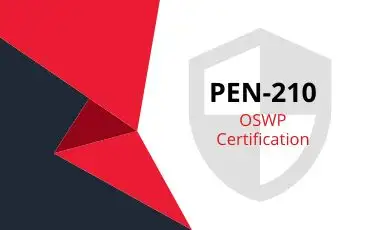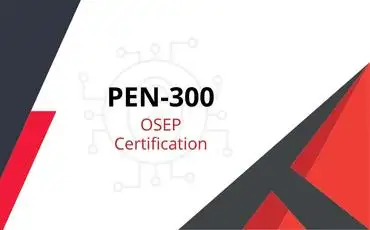Offensive Security Web 200 (OSWE) Course
- Modules : 10
- Duration: 40 Hours
- Level : Expert
- Rating : ★★★★★
As of my last update in January 2022, Offensive Security does not provide a dedicated “Offensive Security Web 200” course. Offensive Security does, however, provide a number of courses in web application security, penetration testing, and ethical hacking.
The “Offensive Security Web Expert” (OSWE) certification is one of the courses that may be relevant to your inquiry. Here’s an overview of the OSWE certification:
The Offensive Security Web Expert (OSWE) course, sometimes known as Offensive Security Web 200 (OSWE), is an immersive and hands-on training curriculum designed for those seeking to become skilled web application security experts. This course focuses on providing learners with the skills and information required to properly discover and exploit web application vulnerabilities.
The Offensive Security Web 200 (OSWE) course:
Comprehensive Web Application Security Training: The OSWE course teaches theoretical ideas as well as practical approaches for web application security. Participants get in-depth knowledge of typical web application vulnerabilities and attack vectors.
Hands-On Labs and activities: The course focuses on hands-on learning through practical labs and activities. Participants can apply their knowledge in a controlled setting to obtain real experience finding and exploiting web application vulnerabilities.
Real-World Scenarios Simulation: This course mimics real-world scenarios and obstacles that are routinely encountered during web application security assessments. Participants learn how to evaluate web applications in a variety of scenarios, including current and older systems.
Focus on Advanced approaches: The OSWE course extends beyond fundamental ideas to cover advanced approaches for discovering and exploiting web application vulnerabilities. Participants will master advanced exploitation techniques used by skilled penetration testers and attackers.
Web Application Penetration Testing approaches: Participants will learn organized approaches for efficiently performing web application penetration testing. This encompasses approaches for reconnaissance, vulnerability discovery, exploitation, and post-exploitation.
In-depth Coverage of the OWASP Top 10: The course covers the OWASP Top 10, which identifies the most serious online application security threats. Participants learn effective risk identification and mitigation techniques.
Exploitation Frameworks and techniques: Participants get practical expertise with exploitation frameworks and techniques that are routinely used in web application security evaluations. This comprises commercial and open-source tools for vulnerability detection, exploitation, and post-exploitation.
Web Application Firewall (WAF) Evasion Techniques: The course teaches how to circumvent online Application Firewalls (WAFs) and other typical defensive methods used to safeguard online applications. Participants will learn how to avoid detection and successfully exploit vulnerabilities in safe environments.
Practical Application of safe Coding techniques: Participants will learn about safe coding techniques and how to analyze the security posture of web applications from the developer’s perspective. This involves recognizing common code flaws and best practices for secure application development.
Reporting and Documentation Skills: The course highlights the need for clear and complete reporting in web application security evaluations. Participants learn how to properly record their results and share security threats with stakeholders.
Ethical and Legal Considerations: Participants are reminded of ethical and legal considerations in web application security testing, including conducting assessments responsibly, respecting privacy, and adhering to legal requirements.
Certification and Recognition: Successful completion of the OSWE course results in the Offensive Security Web Expert (OSWE) certification, which is recognized globally as a testament to expertise in web application security.
Red Hat Certified Engineer Training in Singapore
Want to start your career in Linux Administration but don’t know what to do? In the Red Hat Certified Engineer Training In Singapore, one will get the chance to start their journey as a linux practitioner in the field of IT Sector.
Linux Administration is big of a challenge for the beginner who has yet to be introduced to the fundamental concepts of a Linux Environment. In the Linux Environment, one gets to learn about the following concepts.
1. System Configuration & Management,
2. Network Services,
3. Security,
4. Kernel & System Performance Tuning, and
5. Troubleshooting.
The Red Hat Aspirants get to work on Red Hat Advanced System Administration Skills via the help of Red Hat Enterprise Linux. Moreover, several organizations have been offering job opportunities for professional linux administrators for the execution of the work processes on their premises. Let’s know more about Red Hat Certified Engineer Training in Singapore!
As of my latest update in January 2022, Offensive Security does not have a certification course named “Offensive Security PEN-200.” However, they do provide a variety of different certifications
Offensive Security’s PEN-210 course, also known as “Enterprise Penetration Testing and Continuous Monitoring,” is a highly advanced training program offered by Offensive Security, the same organization
Offensive Security’s PEN-300 course, commonly known as “Offensive Security Certified Expert” (OSCE), is a high-level training program for experienced penetration testers
As of my last update in January 2022, Offensive Security does not provide a dedicated “Offensive Security Web 200” course. Offensive Security does, however, provide a number of courses in web
Offensive Security does not provide a dedicated “Offensive Security Web 300” course. Offensive Security does, however, provide a variety of training and certification programs
Frequently Asked Questions
The WEB200 certification demonstrates expertise in web security principles, techniques, and best practices, validating the skills required to assess and mitigate security risks in web applications effectively. It enhances the credibility of professionals and opens up advanced career opportunities in the cybersecurity field.
The WEB200 certification assesses a range of skills and knowledge areas essential for web security professionals, including web application vulnerabilities, secure coding practices, web security testing methodologies, threat modeling, and secure architecture design.
Professionals holding the WEB200 certification can pursue various roles in web security and application security, such as web security analyst, application security engineer, security consultant, penetration tester specializing in web applications, or secure code reviewer.
Salary ranges for professionals holding the WEB200 certification vary based on factors such as experience, location, industry, and employer. However, individuals with this certification can typically command competitive salaries, with earning potential ranging from ₹8,00,000 to ₹20,00,000 per year in India, depending on their expertise and level of responsibility.
The difficulty level of the WEB200 certification exam may vary depending on an individual’s prior experience, knowledge, and preparation. However, it is designed to rigorously test candidates’ understanding of web security concepts and their ability to apply them in real-world scenarios, making it a challenging but achievable certification to obtain with adequate preparation.






